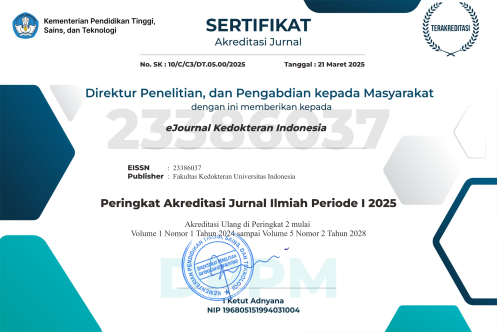Impact of Surgical Complexity and Instrumentation on Perioperative Outcomes in Cervical Spine Surgery
DOI:
https://doi.org/10.23886/ejki.13.1026.1Keywords:
cervical spine surgery, minimally invasive spine surgery, open surgery, instrumentation, perioperative outcomesAbstract
Open cervical spine surgery is commonly performed for complex spinal conditions requiring instrumentation or multilevel intervention. Although minimally invasive spine surgery (MISS) offers potential benefits in reducing tissue trauma, its applicability in complex cervical procedures is still unclear. This study aimed to evaluate the intraoperative burden and clinical outcomes of open cervical spine surgery in complex cases. This retrospective study evaluated the clinical characteristics and surgical outcomes of patients who underwent cervical spine surgery at Dr. Cipto Mangunkusumo National General Hospital, Jakarta, during the period from August 2021 to August 2023. Data collected included operative time, estimated intraoperative blood loss (EIOBL), postoperative hemoglobin and leukocyte changes, and length of stay (LOS). Patients were stratified by the use of instrumentation and extent of surgery (≥3 versus <3 vertebral levels). The mean operative time was 256 ± 95 minutes, with a mean EIOBL of 252 ± 223 mL. Surgery involving ≥3 vertebral levels was significantly associated with longer operative time (p=0.012), but not with increased EIOBL, laboratory changes, or LOS. Instrumentation, used in 71% of cases, was associated with increased operative time and blood loss, although these differences were not statistically significant. In conclusion, open cervical spine surgery in complex settings increases operative time but does not significantly impact perioperative morbidity. Surgical complexity likely contributes more to intraoperative burden than surgical approach.
Downloads
Downloads
Published
How to Cite
Issue
Section
License
Copyright (c) 2025 Mohamad Saekhu, Ria Amelia, Azhar Farisyabdi Kurniawan, Renindra Ananda Aman, Syaiful Ichwan, Setyo Widi Nugroho

This work is licensed under a Creative Commons Attribution-NonCommercial 4.0 International License.
Accepted 2025-09-15
Published 2025-08-30



